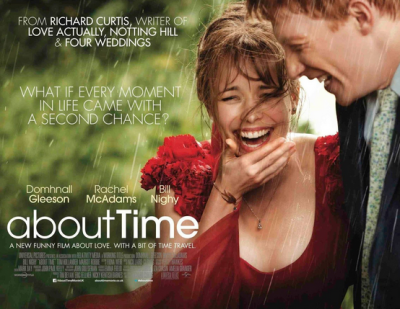About Time is the latest film by writer and filmmaker Richard Curtis. If you loved his other films, which include Notting Hill, Love Actually and Four Weddings and a Funeral, you will love this one. Curtis has a distinctive voice and style that weaves through his work, and this film is no exception. It’s a small film with a big life lesson, and it had me raptured.
I was lucky enough to spend time with Curtis recently at a small press conference. I sat in the first row and asked as many questions as I could. He was what I expected: honest, direct and seemingly very in touch with his feelings, which you would expect after viewing his work for the last 20-30 years like I have. I was lucky to have witnessed part of Four Weddings being shot whilst living in London in 1993 right on the street I was living on at the time. He was very happy to reminisce about the scene and made me feel like I was a part of something quite special. Every time I watch Four Weddings, I remember that moment. That’s the kind of man he is: a maker of special moments. Head over to IMDB.com now and check out his resume. It’s unbelievably impressive.
Here are some of my favorite parts of our conversation:
Where did the idea for a movie about time travel derive?
Richard Curtis: “The idea for the film, in fact, I can specifically remember, and often you can’t – it came from a conversation with a friend about whether or not we were happy, and we both came to the conclusion we were not as happy as we should be. And we kept talking about what would be the perfect day. And we said, ten years ago, we would have said we’d like to fly to Las Vegas, win $1 million, get a text saying that you’ll be nominated for an Oscar. And now, the happiest day was the one we were having, just having lunch with each other, taking your kids to school, having dinner with the family.”
“And I thought how can I write a film about something as simple and it seemed to be important to me as possible. And I thought, well, the only way is make up a huge contraption of time travel, create a character who can go anywhere, make any of these choices, and if that person chooses to go back just to a normal day, then you might be able to make the point in a way with some jokes, as well.”
Since making this film, you have since declared there is no more directing for you in your future. Why is that?
RC: “I hated every minute of it. It’s very tense directing.”
Was there anything that surprised you about either the process or the finished product of the film?
RC: “I think there’s a big thing, actually. And it is credit to these two (Bill Nighy and Domhnall Gleeson) , but I think the accumulative effect of the father and son story is stronger than we thought it would be, I can’t quite explain that. I think it may be the fact that in a way, Bill’s in a lot of scenes he didn’t seem to be in. There are just all those early scenes where he’s making the mistake with the suntan cream. When you looked at it, he didn’t seem to be in every scene in the family house, and then he was. He was there dancing, he was there sitting, he was there reading when they were doing the garden. And I think, somehow, the accumulative effect of the father and son thing turns out to have been stronger when people see the film than I thought it would be, which is of course very rewarding and lucky. So, that’s been something of a surprise, I think.”
I was wondering if part of the reason you thought of Rachel McAdams, besides being such a great actress, is because of Time Traveler’s Wife, and if she’s worried about being typecast in time travel movies.
RC: “Well, actually, kind of in a way, the answer’s the opposite, which is that we very nearly didn’t offer it to Rachel because it thought it might be a wasted month while we sent the script to her and she said, well, obviously, I’m not going to do that because I did The Time Traveler’s Wife. We so wanted her that we thought we’d risk it. We never talked about that film particularly until she saw the first cut of the trailer. And she said, oh, my gosh, there’s one shot when you’re asking her to marry you, and she said that is exactly the same as one shot in Time Traveler’s Wife when I think Hugh Jackman was asking her to marry, she asked, are you worried? And I said, I’m not worried. And I think it’s literally only you and Jackman who are going to know, so we didn’t worry about it. But, no, I think it was a very different film and a very different mood and tone.”
How did you relate something or make something so relatable with time travel?
RC: “Well, it’s odd, because I think when you watch the film, you stop remembering it’s sort of time travel quite soon. And I think one of the ways we achieved it was by how low tech it was. And when we edited the movie, I kept saying to everyone, don’t worry, we’re going to make that better. And we went to see four special effects houses and the time travel bit. They did a trick where they like rotoscoped out the characters and made it 3D, and we did a thing where we slowed it down and made them go backwards and put fuzzy stuff around the side. And all of that was a disaster, and it looked awful. I think by making it so banal, you can sort of fit in the sci-fi with all the human stuff.”
“And I worked so little on it because I thought to myself, how would you travel back in time, you’d probably all instinctively go like that. And that was all I did. That was just about it. That was as far as my imagination went.”
Do you work very closely with the music supervisor? What is the process with the music?
RC: “The music’s terribly important, and funnily enough, when I was doing the movie, I didn’t go back and look at any science fiction movies, but I got very obsessed by songs which I thought were on that subject. So, Ben Folds’ song “The Luckiest,”, and in fact, a Ben Folds song called “Still Fighting It,” which is a father and son song he wrote, and the Ron Sexsmith song Gold In Them Hills–and when I first handed in the movie, it said on the front page, Tim and Time, which is what I wanted to call it, or “The Luckiest,” or “Gold In Them Hills,” which is the names of those songs. So, the songs kind of provide me with an emotional pitch so that when I’m writing I know what I’m aiming for. And it’s something I felt in songs. In Love Actually, I listened to the Mariah Carey All I Want For Christmas is You, and Notting Hill was all based around a very of a Tom Waits song called Downtown Train and a version by Everything but the Girl. And whenever I was trying to feel how I wanted the movie to feel, I would play that song.”
About Time is reaching a theater near you on Friday, November 8th!









 Follow
Follow





I got to see an early screening of this movie. LOVED it. Would have loved to be able to talk with him.